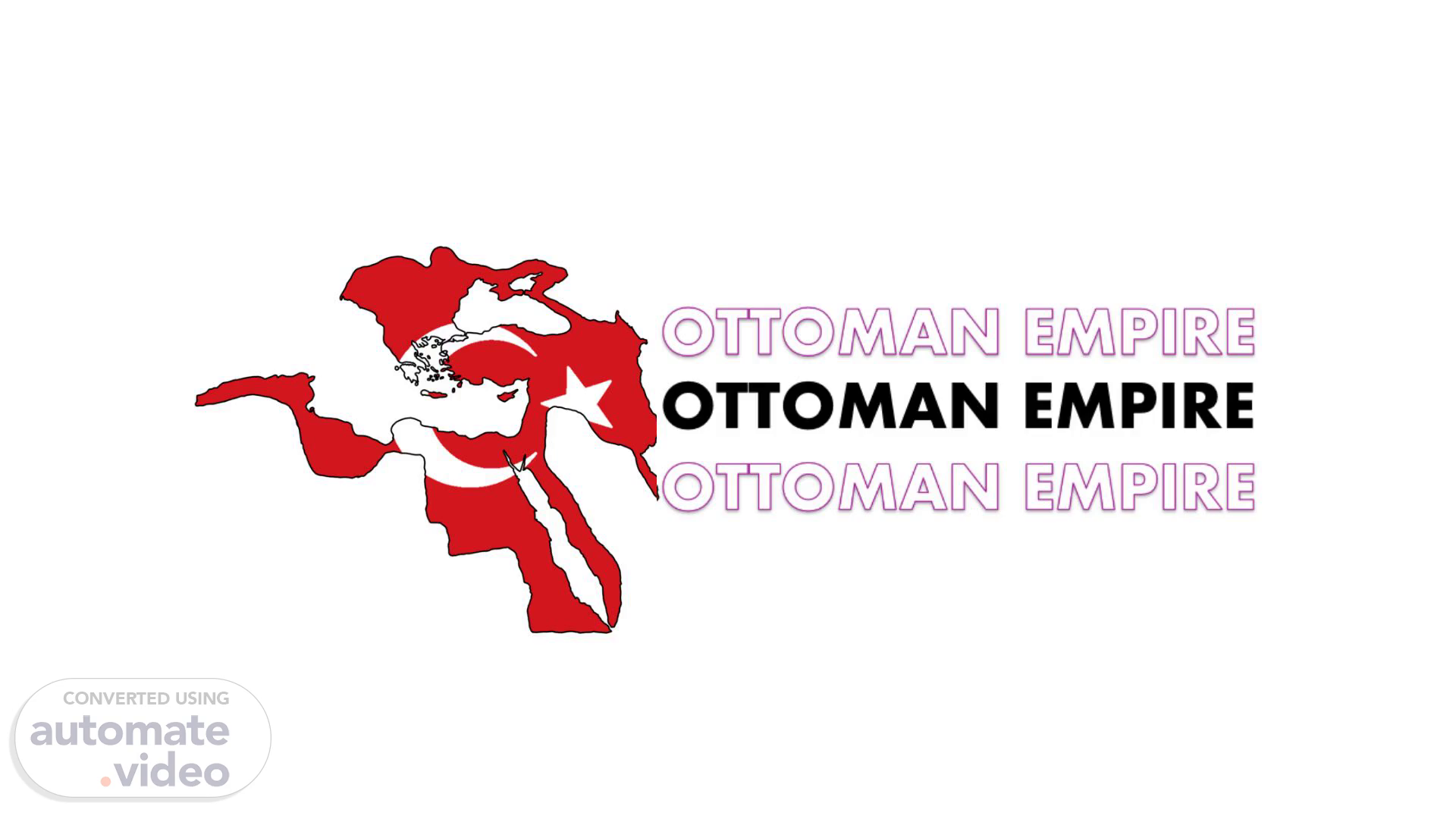Scene 1 (0s)
[Audio] Ottoman Empire. OTTOMAN EMPIRE. A black and white text Description automatically generated.
Scene 2 (7s)
[Audio] How It Began The Ottoman Empire began at the very end of the 13th century A series of raids from Turkic warriors (known as ghazis) led by Osman I, a prince (bey) whose father, Ertugrul. It had established a power base in Söğüt (near Bursa, Turkey)..
Scene 3 (27s)
[Audio] Founding (1299) Founded by Osman I Began as a small principality. Established in Anatolia..
Scene 4 (39s)
[Audio] Expansion Grew rapidly through military conquests. Took over Bayzantine lands. Expanded into Europe, Asia and Africa..
Scene 5 (52s)
[Audio] Their Religion the Ottoman Empire was an Islamic Caliphate ruled by a Sultan, Mehmed V, although it also contained Christians. Jews and other religious minorities. For nearly all of the empire's 600-year existence The non-Muslim subjects endured systematic discrimination and, at times, outright persecution..
Scene 6 (1m 16s)
[Audio] Their Goal 1.Expand territory 2.Spread Islam. 3.Control trade routes..
Scene 7 (1m 28s)
[Audio] Their Result 1. Vast empire across three continents. 2. Cultural and religious influence spread widely. 3. Dominated major trade routes for centuries..
Scene 8 (1m 42s)
[Audio] Leaders Osman I: Established the foundations of the empire and its governance. Orhan (Osman's son): Continued to expand the empire’s territory and consolidated power. Sultan Mehmed II (the Conqueror): Captured Constantinople in 1453, marking a pivotal moment in history and solidifying Ottoman dominance. 10/7/2024.
Scene 9 (2m 9s)
[Audio] The Roles Of The Nations 1.Byzantine Empire: Role: Primary rival; decline culminated in the fall of Constantinople in 1453, allowing Ottoman dominance in the region. 2.Mamluk Sultanate (Egypt): Role: Opponent until defeated in 1517; annexation of Egypt strengthened Ottoman control over the holy cities of Mecca and Medina. 3.Persian Safavid Empire: Role: Rival Shiite power; conflicts, especially during the 16th and 17th centuries, fueled sectarian divisions and regional tensions..
Scene 10 (2m 52s)
[Audio] The Roles Of The Nations (part 2) 4.Habsburg Monarchy (Austria): Role: Key adversary in Central Europe; conflicts, including the sieges of Vienna, marked limits of Ottoman expansion into Europe. 5.Russia: Role: Emerging power in the 18th century; engaged in conflicts over the Black Sea and the Balkans, leading to territorial losses for the Ottomans. 6.Britain and France: Role: Influential in the 19th and early 20th centuries; intervened during the decline of the empire and shaped the political landscape post-World War I 7.Nationalist Movements: Role: Various ethnic groups sought independence; these movements weakened the empire and contributed to its dissolution after World War I..
Scene 11 (3m 51s)
[Audio] Their Culture Cultural Synthesis: The empire blended influences from Islamic, Byzantine, Persian, and Arab cultures. Art and Architecture: Known for stunning structures like the Blue Mosque and rich artistic traditions in painting and calligraphy. Religious Tolerance: Fostered a multiethnic society with relative tolerance for various faiths..
Scene 12 (4m 16s)
[Audio] Life Of Women Social Status: Wealthy women had more access to education and social activities, while poorer women worked in fields or homes. Legal Rights: Women could own property and inherit, but their rights were generally limited compared to men. Family Life: Focused on family and home, some women, especially in the royal harem, held significant influence. 10/7/2024.
Scene 13 (4m 44s)
[Audio] The Decline Military Defeats: Key losses in wars weakened the empire's territorial control and power. Economic Decline: Competition from Europe and internal corruption harmed financial stability. Nationalism: Rising nationalist movements among ethnic groups led to demands for independence, fragmenting the empire..
Scene 14 (5m 8s)
[Audio] The End Of The Ottoman Empire After fighting on the side of Germany in World War I and suffering defeat. The empire was dismantled by treaty and came to an end in 1922 When the last Ottoman Sultan, Mehmed VI, was deposed and left the capital of Constantinople (now Istanbul) in a British warship..
Scene 15 (5m 30s)
[Audio] The Summary In summary, the Ottoman Empire's complex history and its eventual dissolution have left a lasting impact on contemporary political, social, and cultural dynamics in regions that were once part of this vast empire. Understanding this legacy is crucial for comprehending current events and conflicts in the Middle East and the Balkans..
